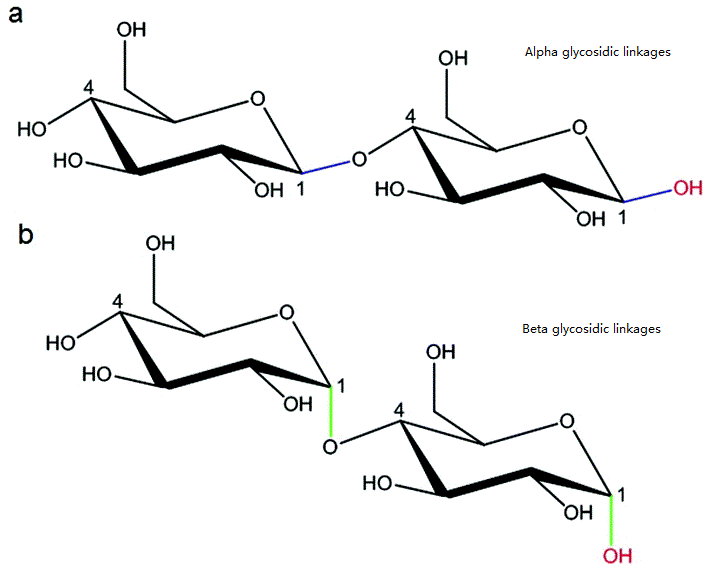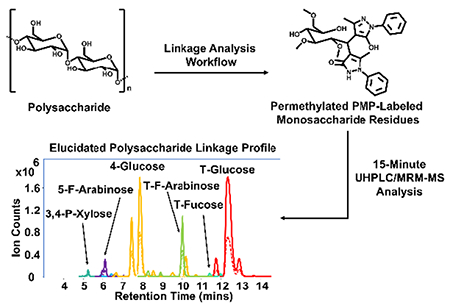Glycan Linkage Position Analysis Service
- Biomedical Research
- Biopharmaceutical Quality Control
- Vaccine and Immunology Research
- Structural Biology
Glycan Linkage Position Analysis Service is an analysis service focused on identifying the carbon position and configuration of monosaccharide linkages in glycans. By integrating technologies such as mass spectrometry (MALDI-TOF, ESI-MS/MS), nuclear magnetic resonance (NMR), high-performance liquid chromatography (HPLC), and capillary electrophoresis (CE), this service accurately distinguishes glycan isomers with similar structures but different linkage positions. It provides precise linkage information for complete glycan structure analysis, revealing their three-dimensional structure and functional relationships, offering a highly reliable structural foundation for both research and applied studies.
Glycans are widely present in biological systems and are key molecules in processes such as cell recognition, signal transduction, and immune regulation. In addition to the types and sequences of monosaccharides, the linkage positions (glycosidic linkage position) and configurations (α/β) between monosaccharides are also core factors that influence the three-dimensional conformation and biological function of glycans. For example, oligosaccharides with 1→3 and 1→4 linkages may have completely different immune recognition properties, while even small differences in branching points can alter protein stability or receptor binding capabilities.

Danks AE. et al. Materials Horizons. 2016.
Services at MtoZ Biolabs
Leveraging advanced platforms such as mass spectrometry, chromatography, NMR, and CE, MtoZ Biolabs offers Glycan Linkage Position Analysis Service to accurately identify the carbon positions and configurations of monosaccharide linkages in glycans, distinguishing highly similar linkage isomers. This service provides crucial structural information for glycomics research, drug quality control, immunology studies, and structural biology.
Analysis Workflow
The main analytical workflow of the Glycan Linkage Position Analysis Service is as follows:
1. Sample Preparation and Pretreatment
Release and purify target glycans from biological samples such as glycoproteins, glycolipids, or cell lysates.
2. Derivatization
Perform methylation or other derivatization reactions to enhance the sensitivity and specificity of linkage position detection.
3. Separation and Detection
Separate glycan isomers using HPLC, UPLC, or CE, followed by structural analysis with high-resolution mass spectrometry or NMR.
4. Data Interpretation and Structural Elucidation
Analyze glycan fragment ion patterns and NMR signals to determine linkage positions and configurations.

Galermo AG. et al. Anal Chem. 2018.
Service Advantages
1. Advanced Analysis Platform: MtoZ Biolabs established an advanced Glycan Linkage Position Analysis Service platform, guaranteeing reliable, fast, and highly accurate analysis service.
2. One-Time-Charge: Our pricing is transparent, no hidden fees or additional costs.
3. High-Data-Quality: Deep data coverage with strict data quality control. AI-powered bioinformatics platform integrates all Glycan Linkage Position Analysis Service data, providing clients with a comprehensive data report.
4. High resolution and high sensitivity: Capable of detecting low-abundance glycans and subtle structural differences.
5. Wide sample compatibility: Supports the analysis of various sample types, from purified glycans to complex biological matrices.
Sample Submission Suggestions
Sample Types
Accepts a wide range of samples, including purified glycans, glycoproteins, polysaccharides, tissue extracts, and cell lysates.
Storage and Transportation
Samples should be stored at low temperature (≤ -20°C). Ship on dry ice. Avoid repeated freeze-thaw cycles.
It is recommended to contact the MtoZ Biolabs technical team prior to sample submission to obtain detailed and tailored guidelines for sample preparation and submission.
Applications
Examples of applications for Glycan Linkage Position Analysis Service:
Analyze disease-associated glycan structural changes to identify potential biomarkers, supporting early diagnosis and prognosis evaluation.
Monitor the uniformity and stability of therapeutic glycoprotein glycans to ensure drug safety and efficacy.
Identify pathogen-associated glycoepitopes to aid antigen design and the development of immunization strategies.
Elucidate the spatial conformation of glycans on protein complexes or cell surfaces to support molecular modeling and functional studies.
Deliverables
1. Comprehensive Experimental Details
2. Materials, Instruments, and Methods
3. Total Ion Chromatogram & Quality Control Assessment (project-dependent)
4. Data Analysis, Preprocessing, and Estimation (project-dependent)
5. Bioinformatics Analysis
6. Raw Data Files
Related Services
Glycan Separation and Purification Services
How to order?







